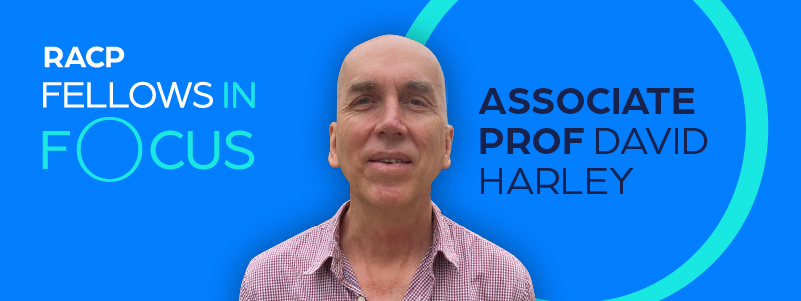RACP Fellows in Focus: A/Prof David Harley
Date published:
06 Apr 2021

“My speciality deals with the health of populations. I think about the health of populations rather than individuals,” Associate Professor David Harley told us when asked about the main reason he was a specialist. “I’ve certainly asked myself why I became a population health specialist, rather than a psychiatrist or a pathologist or something else.”
David, who worked in Indigenous community-controlled health organisations in far North Queensland early in his career said, “Working in Indigenous community-controlled health organisations really got me thinking about medicine, what's worth doing and what's less productive. I was seeing kids with pus coming out of their ears. I thought there has to be a better way to do this.”
“The band-aid measures of antibiotic-drops in-ears etc. weren’t working, and it's obvious that the environment was the cause. Chronic ear infections are generally much less common amongst non-Indigenous kids, to see children with ear infections on such a chronic basis got me thinking. Moreover, it really became obvious to me that it was the social and the physical environment that led to these outcomes and that was where we needed to make a change.”
David shares that the environment, in terms of systemic discrimination and the physical environment, “has consequences, including social consequences and consequences on education, as well as on health.”
When asked about his impact on changing the above-mentioned problems, David said “I hope I've had some influence in terms of teaching future doctors and being involved in Indigenous health at a population level, including when I was doing my training in public health medicine. Also, in terms of involvement with College processes, for example, a working party on Indigenous health that I worked with the College on. And also, in research.”
“I've gone on to do various other pieces of work with different patient population groups, including people with intellectual disabilities, with whom I’ve worked as a clinician, researcher, and advocate. I brought those two interests together a couple of years ago in a legal journal article regarding the intersection between Indigenous health and incarceration because that's certainly something that we as Australians need to be aware of.”
David’s experience is vast and his experience enormous, so when asked what his most valuable skill is, he said, “It's hard to say. It'd be interesting to ask other people what they think my most valuable skill is. If we're talking about technical skills, it's the training that I have in population health through my specialist training with the RACP.” Additionally, combining “academic qualifications, including a doctorate in epidemiology with clinical practice and a fairly wide range of experiences and exposures, has given me a particular approach in population health and epidemiology, which are my most valuable skills.”
The journey that David has been on is not without its influencing factors. The person who has influenced him most in his career is “Adrian Sleigh, who was my PhD supervisor and subsequent mentor.” Adrian Sleigh is also a Fellow of the College in adult medicine and, “was an eminent, international health researcher and I guess his approach to science, population health and also to medicine particularly influenced me.”
From being influenced to influencing, David shares that he would like his lasting impression on medicine to be to leave the world, “at least a slightly better place.”
“I hope to make a little bit of a difference. I have been active in the College developing the position papers on climate change. I think the RACP has been very impressive in terms of the lead role that they've taken within the medical community on this particular issue.
“I would also like to help younger people and the people who I either mentor or supervise. They're the future. We've got a lot to worry about in the world in terms of environmental degradation, the potential for pandemics which is very real right now…I hope that the world might be left in a better state for children.”
On the advice David would give to those looking to emulate the same career path he confessed, “I think everyone has to follow their own path. I value the particular training that I've had so I certainly wouldn’t discourage future public health medicine trainees, who’ll be needed for COVID-19 and whatever pandemics come afterwards. Keep your life and your work diverse. Remember what’s important.”